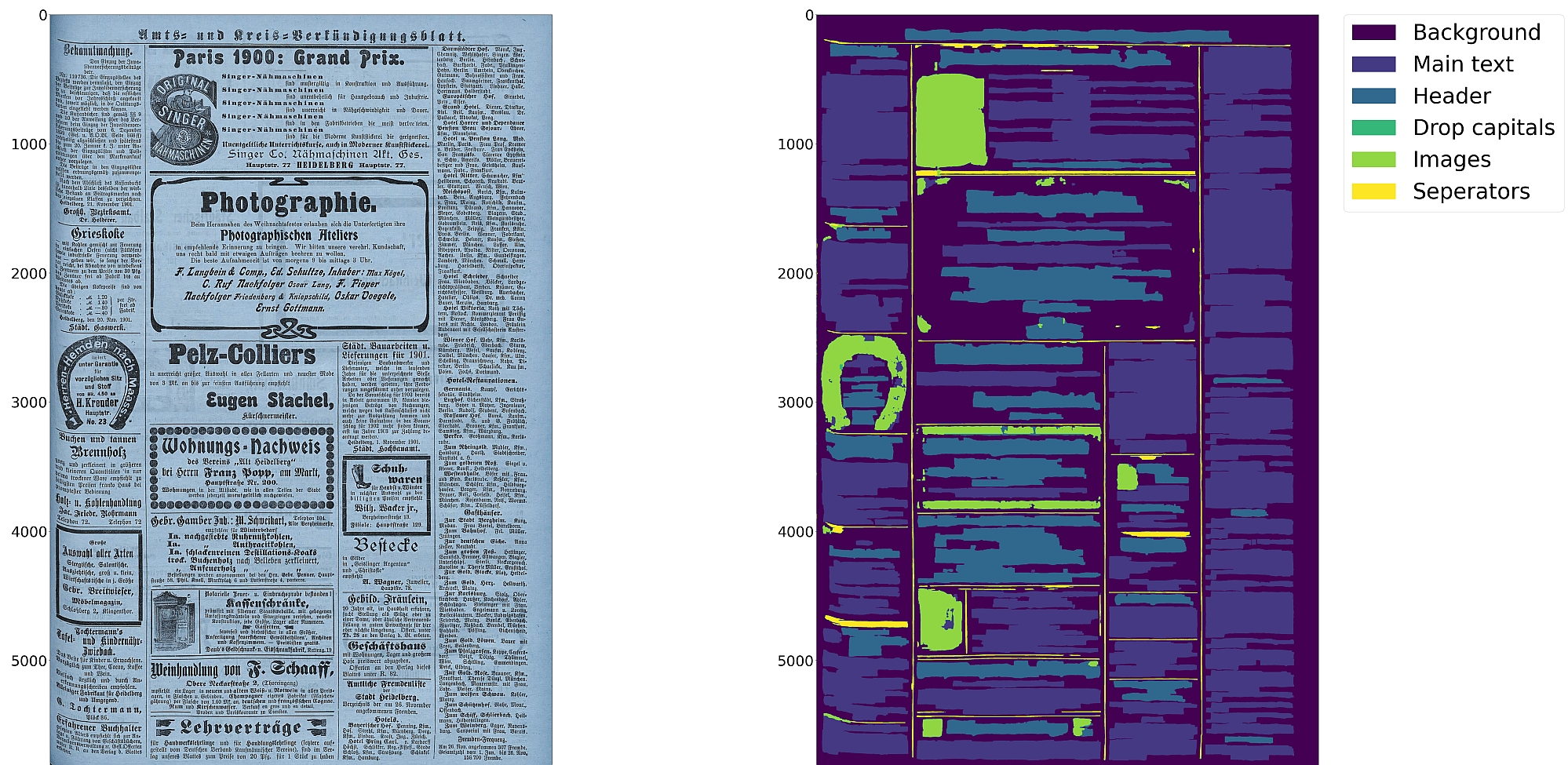114 lines
5.5 KiB
Markdown
114 lines
5.5 KiB
Markdown
# Eynollah
|
|
> Document Layout Analysis (segmentation) using pre-trained models and heuristics
|
|
|
|
[](https://pypi.org/project/eynollah/)
|
|
[](https://circleci.com/gh/qurator-spk/eynollah)
|
|
[](https://github.com/qurator-spk/eynollah/actions/workflows/test-eynollah.yml)
|
|
[](https://opensource.org/license/apache-2-0/)
|
|
|
|

|
|
|
|
## Features
|
|
* Support for up to 10 segmentation classes:
|
|
* background, [page border](https://ocr-d.de/en/gt-guidelines/trans/lyRand.html), [text region](https://ocr-d.de/en/gt-guidelines/trans/lytextregion.html#textregionen__textregion_), [text line](https://ocr-d.de/en/gt-guidelines/pagexml/pagecontent_xsd_Complex_Type_pc_TextLineType.html), [header](https://ocr-d.de/en/gt-guidelines/trans/lyUeberschrift.html), [image](https://ocr-d.de/en/gt-guidelines/trans/lyBildbereiche.html), [separator](https://ocr-d.de/en/gt-guidelines/trans/lySeparatoren.html), [marginalia](https://ocr-d.de/en/gt-guidelines/trans/lyMarginalie.html), [initial](https://ocr-d.de/en/gt-guidelines/trans/lyInitiale.html), [table](https://ocr-d.de/en/gt-guidelines/trans/lyTabellen.html)
|
|
* Support for various image optimization operations:
|
|
* cropping (border detection), binarization, deskewing, dewarping, scaling, enhancing, resizing
|
|
* Text line segmentation to bounding boxes or polygons (contours) including for curved lines and vertical text
|
|
* Detection of reading order
|
|
* Output in [PAGE-XML](https://github.com/PRImA-Research-Lab/PAGE-XML)
|
|
* [OCR-D](https://github.com/qurator-spk/eynollah#use-as-ocr-d-processor) interface
|
|
|
|
## Installation
|
|
Python versions `3.8-3.11` with Tensorflow versions >=`2.12` are currently supported.
|
|
|
|
For (limited) GPU support the CUDA toolkit needs to be installed.
|
|
|
|
You can either install via
|
|
|
|
```
|
|
pip install eynollah
|
|
```
|
|
|
|
or clone the repository, enter it and install (editable) with
|
|
|
|
```
|
|
git clone git@github.com:qurator-spk/eynollah.git
|
|
cd eynollah; pip install -e .
|
|
```
|
|
|
|
Alternatively, you can run `make install` or `make install-dev` for editable installation.
|
|
|
|
## Models
|
|
Pre-trained models can be downloaded from [qurator-data.de](https://qurator-data.de/eynollah/).
|
|
|
|
In case you want to train your own model to use with Eynollah, have a look at [sbb_pixelwise_segmentation](https://github.com/qurator-spk/sbb_pixelwise_segmentation).
|
|
|
|
## Usage
|
|
The command-line interface can be called like this:
|
|
|
|
```sh
|
|
eynollah \
|
|
-i <image file> \
|
|
-o <output directory> \
|
|
-m <path to directory containing model files> \
|
|
[OPTIONS]
|
|
```
|
|
|
|
The following options can be used to further configure the processing:
|
|
|
|
| option | description |
|
|
|----------|:-------------|
|
|
| `-fl` | full layout analysis including all steps and segmentation classes |
|
|
| `-light` | lighter and faster but simpler method for main region detection and deskewing |
|
|
| `-tab` | apply table detection |
|
|
| `-ae` | apply enhancement (the resulting image is saved to the output directory) |
|
|
| `-as` | apply scaling |
|
|
| `-cl` | apply contour detection for curved text lines instead of bounding boxes |
|
|
| `-ib` | apply binarization (the resulting image is saved to the output directory) |
|
|
| `-ep` | enable plotting (MUST always be used with `-sl`, `-sd`, `-sa`, `-si` or `-ae`) |
|
|
| `-ho` | ignore headers for reading order dectection |
|
|
| `-di <directory>` | process all images in a directory in batch mode |
|
|
| `-si <directory>` | save image regions detected to this directory |
|
|
| `-sd <directory>` | save deskewed image to this directory |
|
|
| `-sl <directory>` | save layout prediction as plot to this directory |
|
|
| `-sp <directory>` | save cropped page image to this directory |
|
|
| `-sa <directory>` | save all (plot, enhanced/binary image, layout) to this directory |
|
|
|
|
If no option is set, the tool will perform layout detection of main regions (background, text, images, separators and marginals).
|
|
The tool produces better quality output when RGB images are used as input than greyscale or binarized images.
|
|
|
|
#### Use as OCR-D processor
|
|
|
|
Eynollah ships with a CLI interface to be used as [OCR-D](https://ocr-d.de) processor.
|
|
|
|
In this case, the source image file group with (preferably) RGB images should be used as input like this:
|
|
|
|
```
|
|
ocrd-eynollah-segment -I OCR-D-IMG -O SEG-LINE -P models
|
|
```
|
|
|
|
Any image referenced by `@imageFilename` in PAGE-XML is passed on directly to Eynollah as a processor, so that e.g.
|
|
|
|
```
|
|
ocrd-eynollah-segment -I OCR-D-IMG-BIN -O SEG-LINE -P models
|
|
```
|
|
|
|
uses the original (RGB) image despite any binarization that may have occured in previous OCR-D processing steps
|
|
|
|
## How to cite
|
|
If you find this tool useful in your work, please consider citing our paper:
|
|
|
|
```bibtex
|
|
@inproceedings{rezanezhad2023eynollah,
|
|
title = {Document Layout Analysis with Deep Learning and Heuristics},
|
|
author = {Rezanezhad, Vahid and Baierer, Konstantin and Gerber, Mike and Labusch, Kai and Neudecker, Clemens},
|
|
booktitle = {Proceedings of the 7th International Workshop on Historical Document Imaging and Processing {HIP} 2023,
|
|
San José, CA, USA, August 25-26, 2023},
|
|
publisher = {Association for Computing Machinery},
|
|
address = {New York, NY, USA},
|
|
year = {2023},
|
|
pages = {73--78},
|
|
url = {https://doi.org/10.1145/3604951.3605513}
|
|
}
|
|
```
|